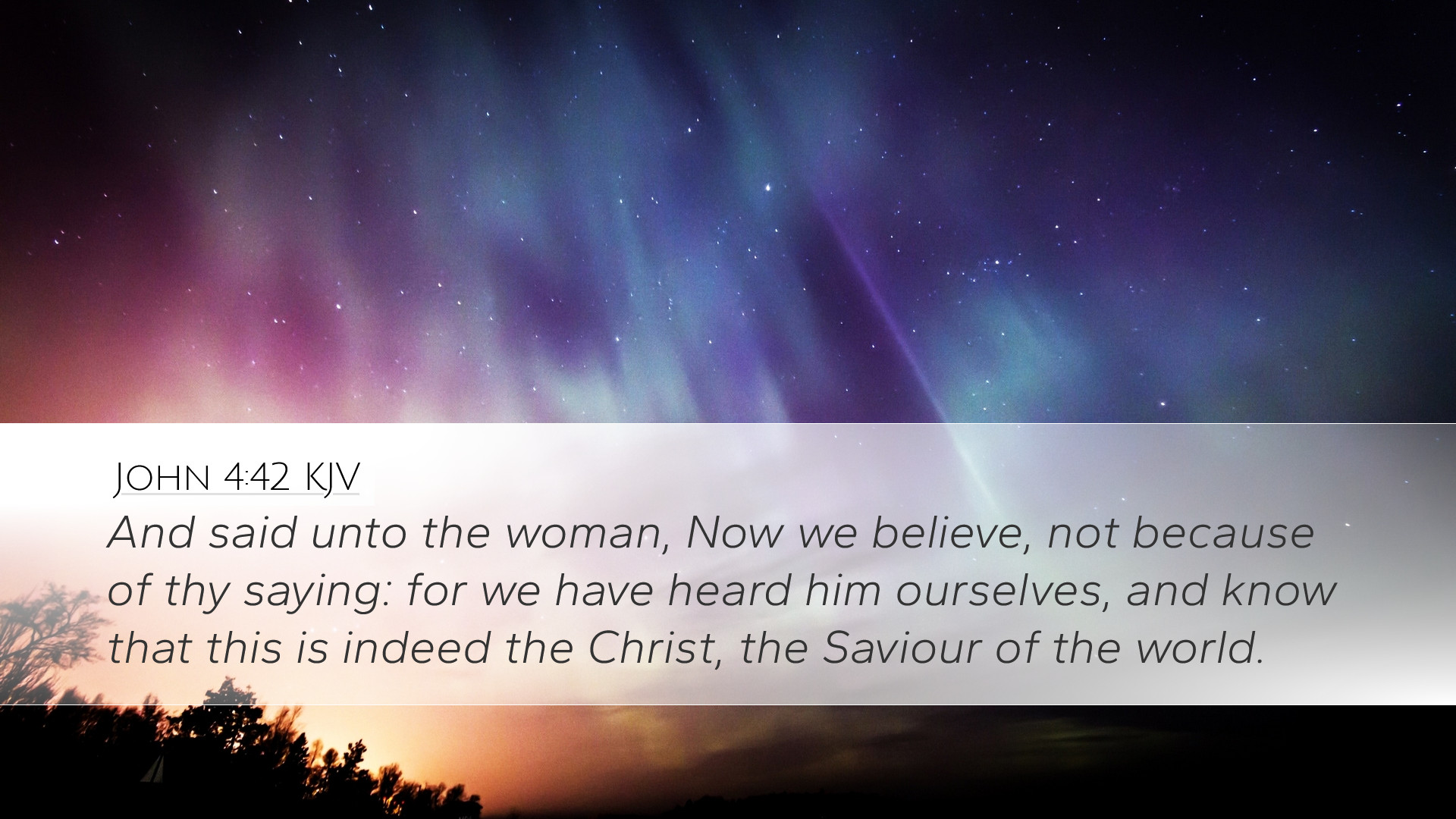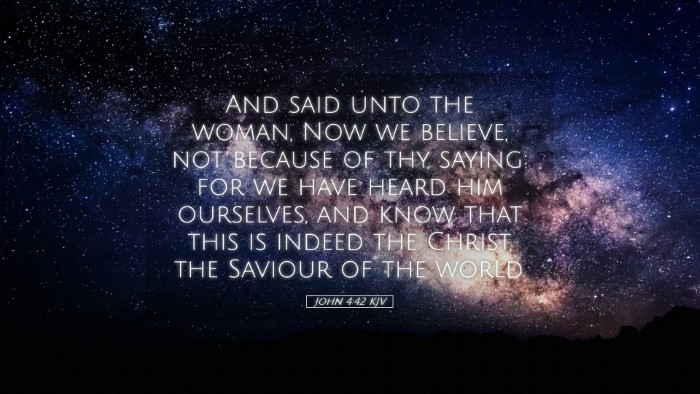Commentary on John 4:42
John 4:42 reads: "And said to the woman, Now we believe, not because of your saying: for we have heard him ourselves, and know that this is indeed the Christ, the Savior of the world."
Introduction
This scripture encapsulates the turning point in the narrative of Jesus' encounter with the Samaritan woman at the well. It reflects the transformative nature of faith and the importance of personal experience in recognizing Christ as the Savior. In this commentary, insights from Matthew Henry, Albert Barnes, and Adam Clarke are synthesized to provide a deeper understanding of this profound declaration of faith.
Contextual Analysis
To grasp the full weight of John 4:42, it is vital to consider the surrounding context. Prior to this verse, Jesus engages in a deep conversation with a Samaritan woman, revealing His identity as the Messiah and offering her “living water.” The verses that lead up to this declaration highlight the disciples' initial confusion and the woman's evangelistic spirit, as she shares her transformative experience with the townspeople.
- Importance of Samaritans: The Samaritans were considered outcasts by the Jews, and the significance of Jesus' outreach to them can’t be overstated. Matthew Henry emphasizes that Christ’s ministry breaks ethnic and cultural barriers, offering salvation to all.
- The Woman's Testimony: The testimony of the woman serves as a catalyst. Albert Barnes notes that her words sparked curiosity and faith in the hearts of the people, illustrating the power of a personal testimony.
- Transition to Collective Belief: Adam Clarke points out that the transition from belief based on another's testimony to personal conviction is a journey every believer experiences.
The Transformation of Belief
The response of the townspeople illustrates a shift from reliance on the woman’s words to a direct engagement with Christ. This transition is significant for several reasons:
- Personal Experience with Christ: The townspeople's declaration emphasizes that their faith now stems from their personal encounter with Jesus: “for we have heard him ourselves.” This underscores the necessity of a personal relationship with Christ as a foundation for true belief.
- Confirmation of Christ's Identity: The phrase “we know that this is indeed the Christ, the Savior of the world” denotes an acknowledgment of Jesus as the expected Messiah. Matthew Henry relates this to the fulfillment of prophecy, showcasing how the Old Testament expectations culminate in Jesus.
- A Broader Scope of Salvation: The title “Savior of the world” speaks to the universal nature of Jesus’ mission. Albert Barnes elucidates that this declaration extends beyond Jewish confines to embrace all humanity, highlighting the inclusive nature of the Gospel.
The Role of Testimony
The woman’s initial testimony catalyzes a communal exploration of faith. In this passage, her influence illustrates the impact that individual stories can have on collective belief systems. Matthew Henry posits that personal evangelism remains a vital aspect of Christian ministry, as God uses ordinary individuals to bring others to Christ.
Her testimony serves as both an invitation and a challenge, encouraging others to experience the transformative power of Christ for themselves rather than relying solely on secondhand accounts. This theme resonates with contemporary discussions on the importance of authentic testimony in sharing the Gospel.
Theological Implications
Theologically, John 4:42 provides profound insights into the nature of faith and salvation:
- Faith in Christ: Spiritual belief originates not merely from tradition or hearsay, but through personal revelation and acknowledgment of Jesus as the Christ. This aligns with the Johannine theme of knowing Jesus personally.
- Universal Salvation: The verse encapsulates the essence of the Gospel, proclaiming Jesus as the Savior of all, transcending cultural and social divisions. Clarke notes that this foreshadows the Great Commission, where Jesus commands His followers to spread the Gospel to all nations.
- Communal versus Individual Faith: This passage contrasts communal faith as stirred by a personal experience. It invites reflection on the role of the church community in nurturing and expressing belief through shared encounters with Christ.
Application for Ministry
For pastors and ministry leaders, John 4:42 offers valuable principles for evangelism and teaching:
- Encouragement of Personal Testimonies: Encourage congregants to share their faith stories, fostering an environment where personal encounters with Christ lead to communal faith.
- Cultural Sensitivity in Outreach: Be prepared to engage those from different backgrounds, emulating Christ’s example in reaching out to the marginalized and the outcast.
- Focus on Personal Relationship with Christ: Teach that faith is rooted in personal experiences with Christ rather than mere intellectual assent or tradition.
Conclusion
John 4:42 serves as a powerful reminder of the transformative nature of faith that stems from personal encounter with Jesus. The verse encapsulates both the individual journey and communal expressions of belief that are essential in the life of every believer. By examining the insights of Matthew Henry, Albert Barnes, and Adam Clarke, we see the interconnectedness of personal testimony, Christ’s universal mission, and the call to invite others into a transformative relationship with the Savior.


